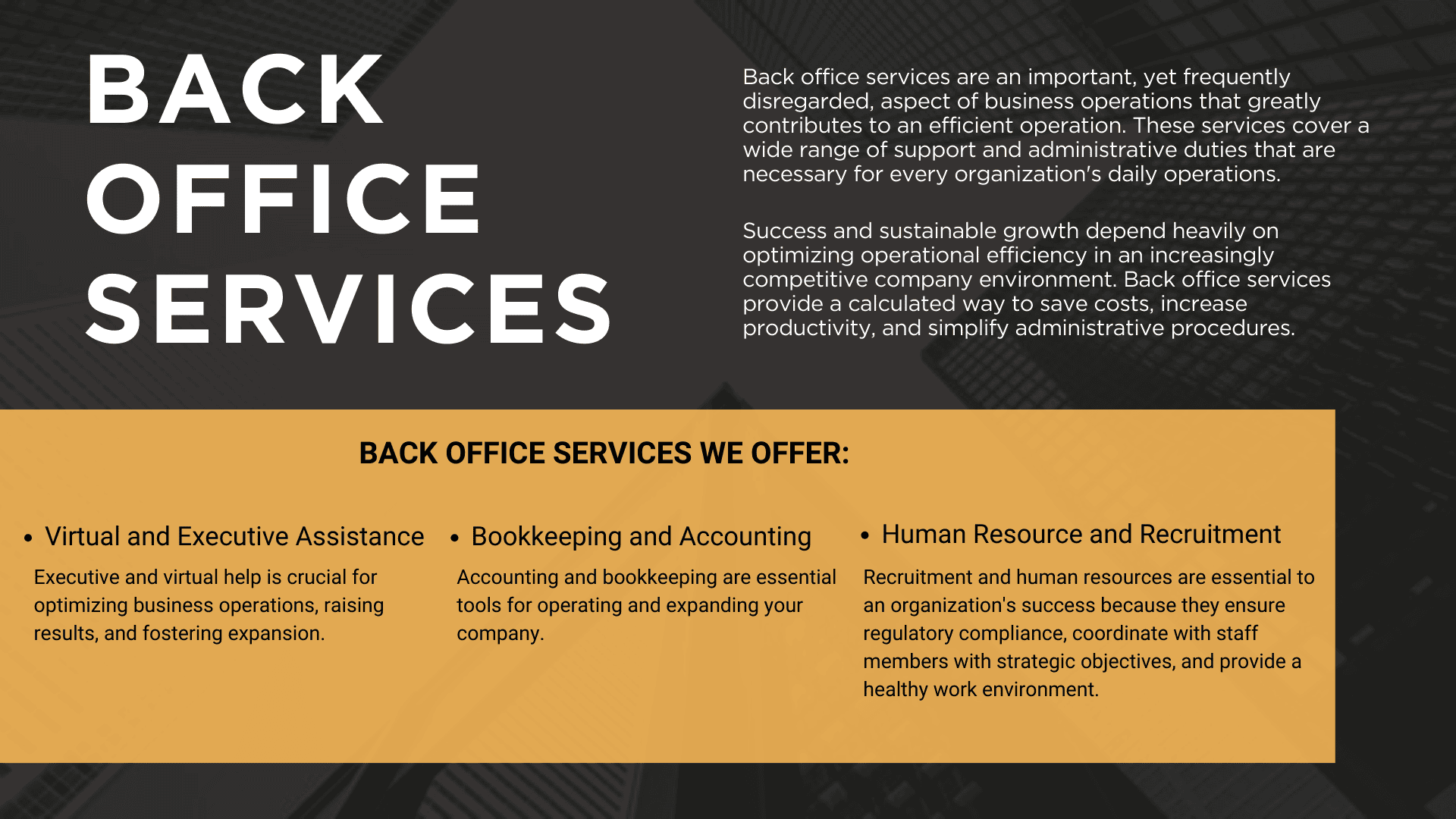What are back office services, and how can they help your business?
Back office services are a variety of support and administrative tasks that are necessary for a business to run smoothly but are not immediately related to dealing with clients. These services serve as the foundation of a company, giving front-end operations the support and infrastructure they need to succeed.

How Can Back Office Services Benefit Your Business?
Outsourcing back-office tasks can significantly reduce operational costs compared to maintaining in-house departments for each function. This can result in substantial savings on overhead expenses, including salaries, benefits, and infrastructure.
By delegating administrative tasks to specialized service providers, businesses can free up valuable time and resources to focus on core activities, such as product development, marketing, and customer service, leading to increased productivity and competitiveness.
Outsourcing back office services provides access to specialized skills and expertise that may not be available internally. Service providers often have professionals with in-depth knowledge and experience in areas such as accounting, IT, and compliance, ensuring high-quality and efficient service delivery.
Back-office outsourcing allows businesses to scale their operations more easily in response to changing market demands or business growth. Service providers can adjust resources and support levels according to fluctuating needs, providing flexibility and agility to the business.
Compliance with regulations and staying updated with technological advancements can be challenging for businesses. Outsourcing back office functions to experienced service providers can help mitigate risks associated with non-compliance, data security breaches, and technological obsolescence.
Here are the back-office services that we offer:
EXECUTIVE AND VIRTUAL ASSISTANCE:
An executive assistant is like the right hand of a company’s top executives or managers. Their primary responsibility is to provide administrative support and ensure smooth operations within the organization. A virtual assistant (VA) provides similar administrative support but works remotely, offering flexibility and cost-effectiveness. They utilize digital tools and communication channels to carry out their tasks.
What Services Do Executive and Virtual Assistants Provide?
Administrative Support:
- Managing emails, scheduling appointments, and arranging meetings.
- Handling phone calls and correspondence.
- Organizing travel arrangements and accommodations.
Data Management:
- Organizing and maintaining digital files and documents.
- Data entry and database management.
- Generating reports and presentations.
Project Coordination:
- Assisting in project planning, tracking progress, and meeting deadlines.
- Coordinating with team members and stakeholders.
- Conducting research and gathering information as needed.
Communication Management:
- Drafting and editing documents, memos, and other business correspondence.
- Managing social media accounts and online presence.
- Responding to inquiries and handling customer support tasks.
Technical Assistance:
- Providing technical support for software applications and digital tools.
- Setting up and managing online meetings and webinars.
- Maintaining website content and managing online platforms.
Personal Assistance:
- Handling personal tasks for executives, such as grocery shopping or booking appointments.
- Managing household matters, travel arrangements, and other personal errands.
- Ensuring work-life balance for busy professionals.
BOOKKEEPING AND ACCOUNTING:
Bookkeeping is the process of recording the daily financial transactions of a business. These transactions include sales, purchases, receipts, and payments. Essentially, bookkeeping involves keeping track of all the money that flows in and out of your business on a day-to-day basis. Accounting, on the other hand, is a broader term that encompasses bookkeeping but goes beyond it. Accounting involves analyzing, interpreting, and summarizing financial data to provide insights into the financial health of a business.
WHAT SERVICES DO BOOKKEEPING AND ACCOUNTING PROVIDE?
Recording Financial Transactions:
Bookkeeping involves accurately recording all financial transactions, including purchases, sales, receipts, and payments. This meticulous record-keeping provides the foundation for all further financial analysis.
Organizing Financial Data:
- Bookkeepers organize financial data in a systematic manner, ensuring easy access and retrieval when needed. This organization is vital for generating financial reports and making informed business decisions.
Maintaining the General Ledger:
The general ledger is the central repository of a company’s financial transactions. Bookkeepers maintain this ledger, updating it regularly to reflect the most current financial information.
Accounts Payable and Receivable Management:
Bookkeepers manage accounts payable (money owed by the company) and accounts receivable (money owed to the company). They track invoices, make payments, and follow up on overdue payments to ensure a healthy cash flow.
Payroll Processing:
- Bookkeeping services often include payroll processing, ensuring that employees are paid accurately and on time. This involves calculating wages, withholding taxes, and issuing paychecks or direct deposits.
Financial Reporting:
Accountants compile and analyze financial data to generate various reports, such as income statements, balance sheets, and cash flow statements. These reports provide valuable insights into the financial health of the business.
Tax Preparation and Compliance:
Accountants help businesses prepare and file their tax returns accurately and on time. They also provide guidance on tax planning strategies to minimize tax liabilities and ensure compliance with tax laws and regulations.
HUMAN RESOURCE AND RECRUITMENT:
Talent Acquisition:
- HR and recruitment teams are responsible for sourcing, screening, and hiring candidates for various job roles within the organization.
- They develop job descriptions, advertise vacancies, conduct interviews, and facilitate the selection process to ensure the right fit for each position.
Onboarding and Training:
- Once new employees are hired, HR oversees their onboarding process, ensuring a smooth transition into the company.
- They organize orientation sessions, provide necessary training, and introduce new hires to company policies and procedures.
Employee Relations:
- HR handles employee relations, acting as a mediator between management and employees to resolve conflicts and address grievances.
- They enforce company policies, ensure compliance with labor laws, and promote a positive work culture.
Performance Management:
- HR plays a key role in evaluating employee performance through performance appraisals and feedback mechanisms.
- They identify areas for improvement, recognize achievements, and provide support for career development.
Compensation and Benefits:
- HR manages compensation and benefits packages, including salaries, bonuses, health insurance, and retirement plans.
- They ensure competitive pay structures and benefits to attract and retain top talent.
Compliance and Legal Responsibilities:
- HR ensures compliance with labor laws, regulations, and industry standards.
- They handle matters related to employee contracts, workplace safety, and diversity and inclusion initiatives.
In Conclusion
Back office services, which include various support and administrative tasks essential to business success, provide the foundation of effective operations. By utilizing these services, businesses can increase cost-effectiveness, concentrate on core competencies, attain scalability, obtain specialized knowledge, and reduce risks. Whether you run a huge organization or a small startup, outsourcing back-office work can improve efficiency and stimulate long-term growth.




